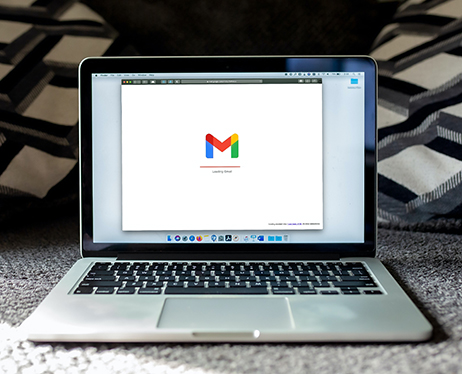Welcome to our Blog
At iPing, we are committed to keeping our clients and readers informed about the ever-evolving landscape of technology and how it impacts businesses. Through our blog posts and news articles, we provide expert analysis, practical tips, and thought-provoking content that can help you stay ahead of the curve and make informed decisions for your IT strategy.
- iPing
The battle ground has been well and truly defined now and the first shots have been fired in the war between Google and Microsoft for top spot in cloud word processing and apps that will help your business to thrive. Google are designing their offering from the ground up and this is offering them great flexibility whereas Microsoft has over twenty years of experience and a customer base that has their products in their DNA and this is something that Google will be hard pushed to match.
From the research that we have done here at iPing, we have found that collaboration is and will be king in this war and this is something that Google is currently winning at. For example if a company has a number of people working on a Google Apps spread sheet, each user can see in real time what the other user is doing whereas this is not the case in the Microsoft offering. Each user in the Google offering is given a different colour and the cell they are typing in is highlighted and this is a handy feature that stops two or more people typing in the same cell.
Bring Your Own Device (BYOD) is going to be massive in this war and for the two companies it is imperative that they get this right. This is now the first time in history that people in their personal lives are ahead of companies in their adoption of technology. In the past it was always companies that had the cutting edge technology. Some companies now expect their employees to be able to access their company technology on personal devices whereas other companies want to keep this all on company hardware. This is something that will need to be addressed and the two companies will need to make provisions for each access method.
Another thing that Microsoft and Google have marked as important in this battle is the ability for you to make video calls. Microsoft bought Skype and they are currently working frantically to improve its integration into their products to give voice and video capabilities. Google has developed Hangout that lets you make voice calls and also video calls to people that you are working with. This is something that will continue to grow over the next few years and will soon be as accepted as email.
At the moment it looks like Google is currently winning the early encounters on this war but there are many more battles remaining. Microsoft has shown time and again that once they decide they will become the best at something, they usually succeed. In the past they showed this with server operating systems, email servers and more recently the battle with Xbox and Sony PlayStation.
- iPing
It is likely that when someone says ‘Big Data’ to you, you either think that this is for multinational companies, you think that it sounds expensive or you may not know what it is. In this article I am going to explain what ‘Big Data’ is and also have a look at a possible uses for SME’s.
Every day, we create 2.5 quintillion bytes of data or information. This information is being collected all around us, all of the time, from sensors, traffic cameras, medical scanners, Facebook, YouTube, Twitter, financial transaction’s etc. Just to give you an idea of how much information 2.5 quintillion bytes is, it has been said that 5 quintillion bytes of data would be equal to all of the words ever spoken by mankind.
Some other considerations in Big Data are.
Volume: Companies have data of all types, easily amassing terabytes of information.
Velocity: The time in which data changes are recorded is ever decreasing and it is crucial. Data is changing in milliseconds now and now days like in the past.
Variety: Data can now come in a multitude of forms - structured and unstructured data such as text, sensor data, audio, video, log files.
Veracity: It is vital to be able to trust the information that you have and need to make decisions. How can you act upon information if you don’t trust it? Establishing trust in big data presents a huge challenge as the variety and number of sources grows.
For the most part this ‘Big Data’ is the story of you and every other person on the planet. The story of where you and your phone goes, the story of all the posts that you put on to social media, the story of what you search for online.
One way mobile phone companies are currently making use of ‘Big Data’ is by analysing the data that they get from mobile devices. This lets them improve their networks and the experience that they are providing to their customers. It also will let them offer new services to retailers who may also have use for this information. This can perhaps let the mobile operator lower the cost of your phone calls or help improve their profit margin.
The key to ‘Big Data’ is the ability to interpret all of the information and put a structure on it where it can be accessed very fast. An organisation which is currently utilising ‘Big Data’ very well is Google. They have access to data information on websites via their initial Google search, emails via Gmail, videos on YouTube and your phones via the phone operating system Android. They also have the expertise to search into ‘Big Data’ with years of search expertise.
One way that SMB’s can benefit from ‘Big Data’ is by researching what is being said about their company on social media. All SMB’s would benefit by knowing what is being said by their competitors and what your future customer requirements are. All this information is contained in ‘Big Data’ and the key is in unlocking the information.
So the key for small and new businesses in Ireland is to find innovative ways to take advantage of ‘Big Data’. ‘Big Data’ is only going to get bigger over the next ten years and the Facebook’s, Google’s and Twitter’s of today will be the new start-up’s that embrace ‘Big Data’. Let’s hope that there are some Irish companies who make it big with ‘Big Data’.
This article was submitted by Mark Kelly from iPing and IT services company based in Dublin city. 01 5241350
- iPing
Here are some tips that I have come to use while being in the IT services business for the past fifteen years. The suggestions below may seem like a bit of a pain but this little bit of pain will also help keep your important information a little bit safer.
- For your main Email account I suggest that you have one password that you can remember easily. This password must be at least eight characters long, it must have special characters in it i.e. {}@~>< and you should throw in some capital tellers and numbers. An example may be based on the word qucikcat and give you the password qU1cKc@t465
- It is important to change this password I would suggest once a month in some small way. This will help make sure that this important password is kept safe and secure.
- For the many websites that you now need a login for I suggest that you open a free account with the company LastPass http://lastpass.com/. This is a secure cloud based service that you can save your passwords on.
You install an application on your computer on your main computer and then every time you need a new password for a website lastPass will generate it for you. When you start up your computer you log into LastPass and it then remembers all the passwords for your many different website logins. You also need a really secure password for lastpass as it will hold quite a few of your passwords.
The great thing about LastPass is that is means you have a different password for every website. So if one website gets compromised and there passwords and emails are stolen (*which seems to happen weekly to major sites these days*) you will not have to go through the process of changing the passwords on all your websites you have ever created a login for. A good example of this was when Sony lost quite a bit of user information.
- Finally I also have really strong passwords for my internet banking that I do not keep in LastPass. This is me just being over safe and cautious in case I forget to log out of lastPass on my main computer when I leave it. Though where money is concerned online I think it is a good precaution to take.
If you follow this system you will have a pretty strong lock and key on your information kingdom and you will just have to remember three or four good passwords.
If you would like to talk to someone in iPing about securing your network please contact us on +353 1 5241350 or email This email address is being protected from spambots. You need JavaScript enabled to view it.
- iPing
Firstly we will look at the types of virus / malware and why it is so important that we protect ourselves and then we will look at some starting points that I suggest to our customers to protect themselves.
Some of the many Virus / Malware threats out there.
Malware
This is the general term that is used to describe all the different types of software that are used to harm and collect information from your computer. Malware or malicious software is the general term for viruses, spyware, scare ware, trojans and worms.
Viruses
A virus is a program that copies itself on your computer, and then copies itself from file to file, infecting each file as it spreads throughout your computer. The virus will then try to spread to another computer and this makes them harder to repair. It is vital that you make sure that you have antivirus installed on your computer and it is just as important to make sure that the antivirus software is kept up to date so it can protect you from new viruses and malware.
Spyware
Spyware is any software that you install on your computer that is collecting information from your computer and sending it to someone on the Internet usually without you knowing it. Spyware can be used as part of marketing campaign or it can be used to collect your passwords and credit card numbers. One very good example of Spyware is the multitude of different tool bars that are now available for Internet browsers. The more Spyware you have on your computer the slower it will run.
Scare Ware
This is an attack on your computer that usually pops up when you are browsing a new website. What usually happens is the website displays a page that looks like an antivirus scan that says it has found hundreds of viruses on your computer and you should download a certain program to resolve this or else. You will usually find that you then have to pay a certain amount of money before you can get your computer working again.
Trojans
A Trojan is a piece of software that you think is doing a simple task on your computer but unbeknownst to you there is some malicious code in the software that is wreaking havoc on the Internet. A Trojan could be sending hundreds of thousands of emails a day from your computer or attacking corporate websites holding them to ransom. There are usually thousands of computers with Trojans installed on them doing these attacks. The major difference between a virus and a trojan is that trojans don't replicate themselves, they must be installed by an unwitting user
Worms
A worm uses the network to copy itself and thus they can really travel rapidly around the Internet. They usually use a hole or vulnerability in a piece of software. Whenever a hole in a piece of software is found the good software companies will provide a patch to remove the hole and fix the vulnerability.
Four Ways To Help Protect You And Your Network:
Antivirus Protection
Once a computer has been compromised with viruses, it is a timely and costly issue to fix. This is a definite case where prevention is better and cheaper than the cure. I suggest that you install your antivirus as soon as you get a new computer and if possible it should be installed before the computer is put on the network. Once you have your antivirus installed, you need to make sure you are running regular virus scans and updating your antivirus definitions daily. I recommend Eset NOD antivirus to our clients.
Staff Training
Whenever a new person starts in your company, they will go through an induction program where they learn about the company and how to do their job. I suggest that as part of this induction process, staff should be made aware of the importance of computer security in the company and how they should always be vigilant for security vulnerabilities. Your staff plays an important role in keeping your computer network secure.
Firewall
A secure network has a firewall installed that is better than the basic one that comes with your Broadband connection. A Firewall is the first line of defence for protecting your network from all the threats on the Internet. A good Firewall will help lock down your network from the outside and it will also help you control and monitor what is happening inside your network. I use Cisco & Sonicwall Firewalls and they catch viruses before they get into the network, prevent hackers accessing the network and also stop your users from going to websites that could harm your network.
Software Patches
To have a secure network, you need to make sure that your computers and servers are secure. One of the steps in making sure your computers and servers are secure is to make sure that software patches are applied to them. In most cases you can let Windows automatic updates deal with updating the operating system but you must make sure you are updating other software that you use to help keep your computer secure. You need to remember that your network is only as secure as the weakest link and if you do not update your computers, you are weakening your network.
These are just some of the basic starting points to having a secure network.
- iPing
Currently there are two main options that you can use for your cloud based business email. They are the solution from Microsoft which is part of Office 365 and the solution from Google which is Google apps for business. In this blog entry we are going to have a look at the option from Google.
Gmail, the Google email service, is one of the most popular email services in the world. Google have employed some of the best minds to work on this email platform, it stands to reason therefore that Google would produce a great product. It also stands to reason that when Google developed this email platform for personal use that they would look to maximise the returns from it in other ways.
One way Google is doing this is by offering businesses the opportunity to use the Gmail backend or to put it another way the Gmail cloud platform to host business’ email. This essentially means you use the standard user-friendly Gmail interface, which we are all familiar with, but you can have your company domain name for your email i.e. This email address is being protected from spambots. You need JavaScript enabled to view it. and not This email address is being protected from spambots. You need JavaScript enabled to view it..
As a business it is vital that you have your email set up using a domain that represents your company and not one of the free types of email. If you are using a free email address; for example @yahoo.com, @eircom.net or @gmail.com you will not give a very professional view of your company.
You have two main options when you are setting up a Gmail account for your business. These options are the free version of the platform or the paid for version. The free version is a taster to get you using the platform and the hope is that as your company grows you will keep using the system.
With the free version, you can have up to ten people in your company using this as your email platform. This makes it ideal for small businesses, teams, voluntary organisations and even your own personal domain. The free version gives you 10GB of email storage per user and this is more than enough for many years of email.
Once you go over the ten user mark or you want to make use of the advanced Google apps features, you need to pay $50 per user per year.
You can compare the Free version and the paid for versions here: www.google.com/enterprise/apps/business/pricing.html
Here are some of the reasons you may decide to use the Gmail platform for your business email:
Enterprise Email without a Server
You do not need to spend 1,000 euro + on buying a server to install your email on, instead you are able to leverage the power of the cloud. The fact that you do not need a server also means that you do not need to spend extra money on managing, servicing and upgrading a server.
Your Email Will Be Mobile
The Gmail platform has been designed around a web interface so you can access it anywhere you have a web connection. You can also access it on your smart phone, tablet and Blackberry. Important for some, on your PC or Mac, you can still set your account up to use Outlook or Mail.
Shared Calendar and Contacts
If you are currently using a POP email account, then you will not have the ability to have shared contacts and calendars in your company. The Gmail platform will give you the facility to do this. In the past you would have had to have an email server in your office to do this.
Ten Gigabytes of Online Storage
You will get a massive 10 gigabytes of mail storage per user in the free account and 25 gigabytes per user on paid account. This could be between 10 and 25 times more storage than you are getting from some email providers for your whole company. This means your important emails can be kept for much longer.
Your Email is Backed Up
As long as it is setup correctly, all of your emails are backed up in the secure Gmail web data storage system. This means you will no longer have the problem of losing all of your emails after a hard disk crash on your computer or server.
Your Email has built in Spam Filter
The Gmail system has an excellent spam filter that will get rid of nearly 98% of all the spam that may be going into your inbox currently. This spam filter also learns from your actions which is a big plus.
Email will be Available 99% of the Time
The current uptime of the Google apps service ranges from 99.98 to 99.99%. This is a very impressive number and is one that most email providers would kill to have.
- iPing
The newly unveiled productivity suite from Microsoft, Office 2013, won't be running on older operating systems like Windows XP and Vista it has been revealed.
Office 2013 is said to be only compatible with PCs, laptops or tablets that are running on the latest version of Windows i.e. either Windows 7 or not yet released Windows 8. So if you are still running an old IT system like XP you will need to upgrade.
According to a systems requirements page for Microsoft for Office 2013 customer preview, the Office 2010 successor is only compatible with Windows 7, Windows 8, Windows Server 2008 R2 or Windows Server 2012.
This was confirmed by a Microsoft spokesperson. Further the minimum requirements states that systems need to be equipped with at least a 1 GHz processor and should have 1 GB of RAM for 32-bit systems or 2 GB for 64-bit hardware. All of the current new computers will have no problem with this.
The minimum storage space that should be available is 3 GB along with a DirectX 10-compatible graphics card for users wanting hardware acceleration.
If you are thinking of using Microsoft Office 2013 you may need to upgrade your computers and software. If you do or if you are not sure why not contact iPing
- iPing
Latest news on Windows 8 is that it will include a reset and refresh button. The reset button will set your computer to the state it was when it was just installed. The refresh button will restore the Windows install to the out of the box state whilst keeping all of your documents and personally installed computer programs intact.
This is great news for anyone who is involved in computer support and also anyone who needs to have their computers supported as it should speed up the resolution time to get a computer from broken to working and less time spent fixing computers means savings for everyone.
One great use of the reset button for anyone looking to sell a computer or pass it on to another department is you just have to click the reset and your computer will be at a working state without all of your sensitive data on it.
Word of advice though don’t get reset and refresh mixed up.
If you want any advice on your IT strategy please contact iPing.
- iPing
We are living in a knowledge era, where everyone is so dependent on technology and requires their IT to work at all times. Given these requirements, just how fast should your IT service company respond to your calls?
In the past, IT service companies have given Next Business Day (NBD) support and this was OK for something that you were able to put off doing for a while. The scenario here is the customer logs the call at some point during the day and the IT service company comes out the next day to fix the problem. A service like this will be acceptable if a problem is just affecting say one person and the problem is not mission critical.
Also quite common on the market is four hour support services where the IT service company will respond to your call within four business hours. Quite alot of the time this can feel like/be NBD support depending on the time of day that you log the call.
Here at iPing we strive to provide a one hour response to our customers as we know how important your business is to you and how important your IT is to your business. If you do not feel like you are getting a fast enough IT service from your current IT provider please give us a call.
- iPing
If you are responsible for IT Services in your company then data backup is something that you regularly need to think about.
You may just be responsible for calling your IT provider if a problem occurs and if this is the case you need to ask your IT provider regularly about your data backup.
A company's data is just too important not to back up. Recent research from Garther states that 75% of companies go out of business after having a major data loss.
Out of all the backup options available at present, online backup options are proving the most popular as it takes the human element out of the backup process hence reducing the risk .
How online backup works:
- A programme is installed on the computers you want to back-up;
- This programme is pointed to the information that needs to be backed up (daily, weekly etc);
- The programme will copy this information onto a secure server that is based on the Internet.
This means your information is backed up in a different location to where you operate which protects you against fire hazards and the theft of your data.
Most times the excuses I hear are "the person who looked after the backup tapes left the company", or often times the person looks at me for a minute before saying, 'I was supposed to be doing that'. So the next time you are talking to your IT provider ask them about the pros and cons of using an online backup solution on your network. Like all questions, it is the questions that are not asked that are the stupid ones.
Your data is important so be sure to back it up.









